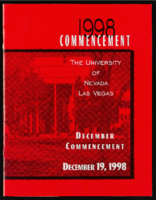Search the Special Collections and Archives Portal
Search Results

Transcript of interview with Jackie MacFarlane by Claytee White, February 4, 2010
Date
Archival Collection
Description
Jacqueline "Jackie" Tilman MacFarlane was born in her grandmother's Las Vegas home at H Street and Clark Ave. Her father John Franklin Tilman was a construction worker at Boulder Dam (now Hoover) in early 1930s. Jackie recalls her family having to move several times the Great Depression and living in rural Nevada. Eventually the family came back to reside in Las Vegas. After graduating from high school, she took a waitress job at the Spot Cafe (Main & Charleston) and then at the Askew Drive-In. It was there that she met her future husband, David MacFarlane, an Air Force cadet. David continued to work at Nellis Air force Base as a civilian until he retired in 1987. Jackie describes raising her children in Fair Circle neighborhood during the 1950s and 1960s; a time when Las Vegas was just a "small town of 50,000." She felt safe and always found work in the casinos. Her work career included being a change girl at the Mint of Fremont St. and working as the front office cashier at the Desert Inn and then working at the Sands Hotel and Casino. Eventually she became a night auditor at Sands Hotel and Casino and then at Sahara Hotel and Casino from 1970-1977. She remembers working nightshift, coming home to get the kids and husband off to school and work. After leaving Sahara, she began selling Vanda cosmetics as a home business, something she still does today.
Text

Transcript of interview with Burton Cohen by Claytee White, January 9, 2009
Date
Archival Collection
Description
In this interview, Burton Cohen discusses his involvement in the Las Vegas casino industry, including booking entertainment for various hotels.
Burton Cohen's long casino executive career began in the mid-1960s when he accepted a proposition to become involved with the transformation of the Frontier Hotel. He left his south Florida roots and law practice to become a co-owner/general manager of the Frontier Hotel. Thus, began his highly regarded Las Vegas presence. For nearly four decades he served in the management of some of the Strip's most famous casinos: Flamingo, Dunes, Circus Circus, Caesar Palace, Thunderbird and the Desert Inn, which remains his favorite. In this interview, Burt reflects on the positions he held, the celebrities he hired and befriended, and offers a unique look at the behind the scenes marketing and entertainment strategies that he helmed. He shares stories of becoming entrenched in casino operations, his reflections of union experiences, and even anecdotes about moving his mother to Las Vegas.
Text

Hernando Amaya oral history interview: transcript
Date
Archival Collection
Description
Oral history interview with Hernando Amaya conducted by Laurents Banuelos-Benitez, Marcela Rodriguez-Campo, and Barbara Tabach on October 18, 2018 and December 3, 2018 for the Latinx Voices of Southern Nevada Oral History Project. In this interview, Hernando Amaya talks about his childhood and education in Bogota, Colombia. He discusses his start in journalism as a young man and working for El Espectador, the Colombian national newspaper. He discusses his experiences reporting on the narco-terrorism occurring in Medellin, Colombia and how this eventually led to his immigration to the United States. Amaya moved to Las Vegas, Nevada in 2001 and continued his career in journalism by working for local Spanish speaking papers and websites. He relates his civic involvement in the Las Vegas area, his work as the president of the Colombian Association of Las Vegas, and various other civic engagements. As a journalist, he asserts the importance of knowing one's culture, storytelling, learning history, and being active in the community.
Text

Transcript of interview with Justice Michael Cherry by Barbara Tabach, September 19, 2014
Date
Archival Collection
Description
Interview with Justice Michael Cherry by Barbara Tabach on September 19, 2014. In this interview, Justice Cherry talks about how he came to Las Vegas and his work as a public defender and as a lawyer in private practice. He also discusses his involvement with Jewish organizations in various capacities, and his involvement with high-profile cases such as the MGM Grand and Las Vegas Hilton fires, earning him the nickname "master of disaster."
Justice Michael Cherry was born in St. Louis, Missouri, and went on to spend his childhood in the Jewish neighborhood of University City. He attended University of Missouri and became a leader in his fraternity, Alpha Epsilon Pi, and a committed ROTC cadet. By the time Justice Cherry graduated from Missouri and was heading to Washington University School of Law, he was a second lieutenant; halfway through law school, he was promoted to first lieutenant. It was also during law school that he married his college sweetheart, Rachel Wolfson. When a bad back prevented him from becoming an active air force officer, he and his wife decided to follow his mother to Las Vegas. Justice Cherry worked both as a law clerk with the Public Defender's Office as well as a security guard at Wonder World when he first moved to the city. After passing the Nevada bar, Cherry took at position with the Public Defender's Office, and later went into private practice as a successful criminal defense attorney. Cherry was elected as district judge in 1998 and 2002. In 2006, he won his campaign for state Supreme Court justice. Justice Cherry was reelected to office in 2012 for another four-year term. He is currently the highest-positioned Jewish official in the state of Nevada. Throughout his years in Las Vegas, Justice Cherry has been an extremely active and influential member of the Jewish community and served as chairman of the Anti-Defamation League and is active in the Jewish Federation. Justice Cherry attributes his commitment to service to his mother. In addition to his service to the Jewish community, he has been active in numerous other service organizations, including March of Dimes, Olive Crest, Adoption Exchange and American Cancer Society.
Text

Transcript of interview with Joseph Thiriot by Claytee White, August 10, 2000
Date
Archival Collection
Description
Joseph Thiriot is a longtime Las Vegas resident who served the community as an educator. He was born in 1906 in Provo, Utah; one of five sons bom to George W. and Elvira Thiriot. He has vivid memories of moving about, including living in Idaho where his father sold a typing machine , a forerunner to the typewriter. Eventually the family moved to a ranch in Pahranagat Valley, Nevada, where the limits of educational opportunities compelled his paients to send him back to Provo to finish his education while living with family there. Gaining a teaching certificate enabled Joseph to teach in rural Nevada. He completed his degree at the University of Utah and after meeting Las Vegas Superintendent Maude Frazier he relocated to Las Vegas to become a teacher. He reminisces about his life and the changes that have occurred over the years in Las Vegas.
Text

University of Nevada, Las Vegas (UNLV) 35th commencement program
Date
Archival Collection
Description
Commencement program from University of Nevada, Las Vegas Commencement Programs and Graduation Lists (UA-00115).
Text

Transcript of interview with Margaret Price by Joanne Goodwin, March 5, 1997
Date
Archival Collection
Description
When farm-girl-turned-waitress, Margaret "Maggie" Price, came to Las Vegas from Ohio in 1950 with her husband, Francis "Frank" Price, she had no idea what was in store for her in the hot desert oasis. Maggie's career spanned a period of historical transformation in Las Vegas when Downtown was becoming overshadowed by the development on the Las Vegas Strip. Vaudeville and striptease acts were still alive, but the arrival of big-named acts, such as the Rat Pack, Barbara Streisand, and the King himself, Elvis Presley, were just beginning to take the lead. Organized crime was still a prominent part of the culture and brothels still operated somewhat openly. The three decades Maggie and Frank worked in Las Vegas provided them with front-row seats for the birth, transformation, and occasional death of numerous casinos, including the Sahara, the Flamingo, the Sands, the Dunes, the Tropicana, and the International. Initially going to work as a waitress at the El Rancho Vegas, Maggie
Text

Mike Montano interview, September 19, 2008: transcript
Date
Archival Collection
Description
First played in Las Vegas with Jack E. Leonard in 1960. Only worked at two hotels during his 24-year Las Vegas career - Flamingo and riviera
Text

Transcript of interview with Dorothy Kelsey by James M. Greene, January 20, 1975
Date
Archival Collection
Description
On January 20, 1975, collector James M. Greene interviewed housewife, Dorothy Kelsey (born May 28, 1916 in Kingman, Arizona) in her home in Nelson, Nevada. This interview covers the early days of Nelson, Searchlight, and Las Vegas, as Mrs. Kelsey offers an in-depth personal narrative on the life of a local old-timer. The interview concludes with a discussion on hotels and casinos.
Text

Transcript of interview with Marion Brooks by Kathleen Kasmir, February 24, 1975
Date
Archival Collection
Description
On February 24, 1975, Kathleen Kasmir interviewed Marion Brooks (born 1913 in Santa Ana, California) about his life in Southern Nevada and his work as a mining engineer. Brooks first talks about his background before talking extensively about his early work in mining. Brooks also mentions some of the professional mining societies of which he was a part, and the two then move on to discuss gambling, recreational activities, and the atomic testing. Other topics covered during the interview include the price of groceries and food, the El Rancho Vegas, social changes, population growth, and environmental changes. The end of the interview then shifts back to Brooks’ work in mining at Blue Diamond and then a discussion on the possible locations of three lost mines.
Text
